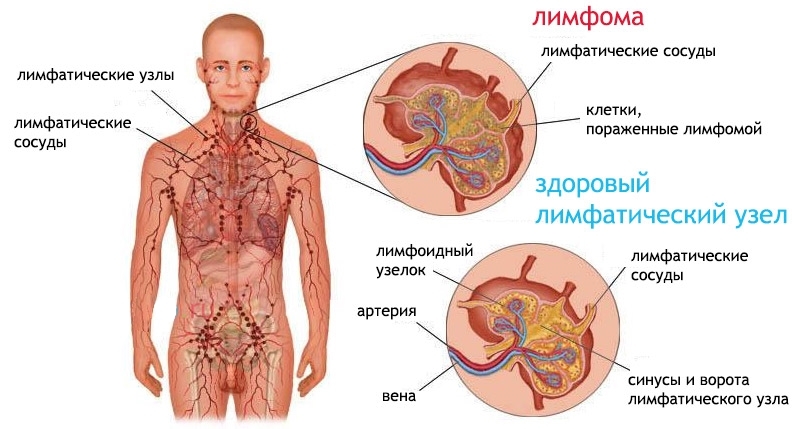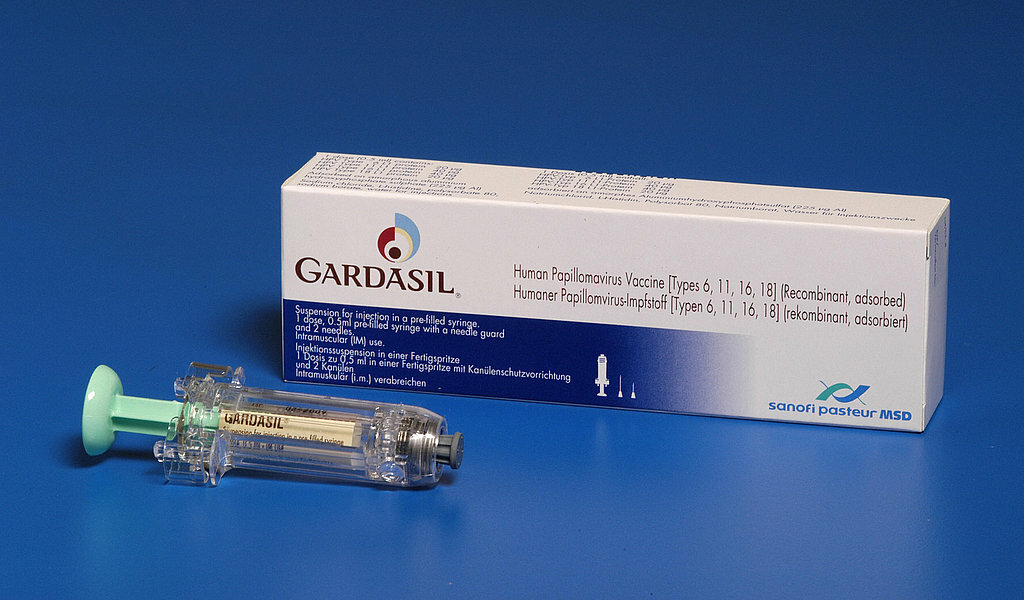Testicular cancer: classification, stages, symptoms, causes of development, diagnosis and treatment methods
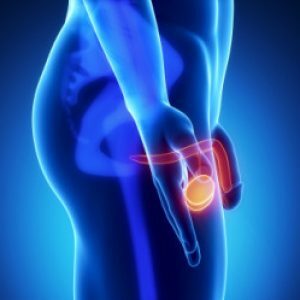 Testicular cancer is a malignant tumor process, which is inherent in the unpredictability of growth and development of pathological cells.Pathology is extremely aggressive.Its prevalence is no more than 2% among all malignant oncologies.According to statistics - this is one of the main causes of death of cancer patients under the age of 35 years.
Testicular cancer is a malignant tumor process, which is inherent in the unpredictability of growth and development of pathological cells.Pathology is extremely aggressive.Its prevalence is no more than 2% among all malignant oncologies.According to statistics - this is one of the main causes of death of cancer patients under the age of 35 years.
Tumor is formed and develops in the sex glands, after which it spreads throughout the body.The tumor process is mainly one-sided, but sometimes there are also bilateral forms.
Table of Contents: Classification of the Stage of Testicular Cancer Cause of Development of Testicular Cancer Symptoms of Testicular Cancer Diagnosis of Disease Testicular Cancer Treatment Methods and ForecastClassification of
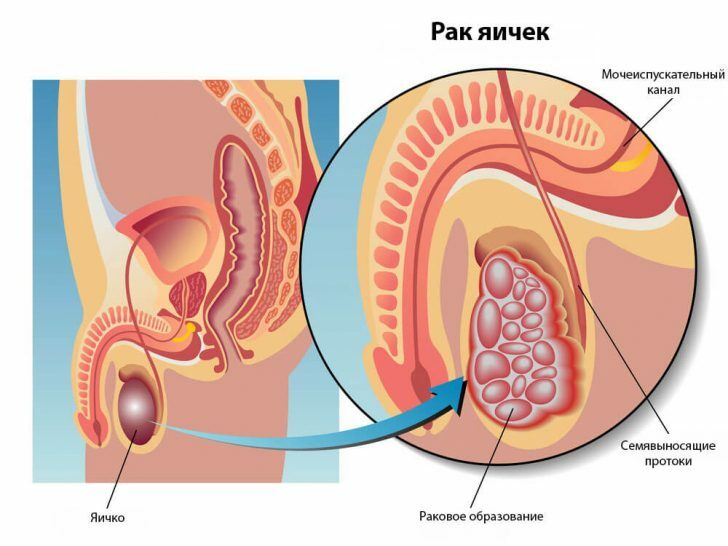
Egg cancer is classified into mixed, germicogenic and non-hydromic tumors.
- Germinogenic tumors develop in 95% of cases and are formed from seminal germ cell structures.
- Mixed tumors contain cells of germinogenic and non-germogenic formations.
- Non-germogenic tumors are formed from the stroma of the testicle.They occur in less than 5% of cases.
Testicular cancer has a different morphological structure: the shape and type of cells. Types of cancer that occur most often:
- seminal.It is formed on the one hand in the form of painless enlargement of the testicle.It grows slowly, does not germinate in other organs;
- is non-mininous.It grows and metastasizes, forming a secondary focus in organs that are located close and on the periphery;
- cellular.It occurs in approximately 3% of cases;
- lymphoma.Such testicular cancer is diagnosed in 4% of all cases.
Stages of testicular cancer
Urology oncologists distinguish four stages of the disease:
- Stage 0. The tumor is located inside the tubules and does not go beyond them.There are no metastases.As a rule, tumor markers are normal.
- Stage 1. Lymph nodes are not affected.Remote metastasis is absent.The tumor can germinate into the testicle, its appendage and reach the belly.There is an increase in tumor markers in the blood serum.
- Stage 2. A tumor can form inside the tubule and grow into a squamous envelope.Affected retroperitoneal lymph nodes.Metastases in them can reach 5 or more centimeters.At the second stage, an elevated concentration of tumor markers can be observed in the blood.
- Stage 3. The tumor can be of any size.Metastases spread to the lymph nodes located above the diaphragm.The third stage affects the bones, lungs and brain.
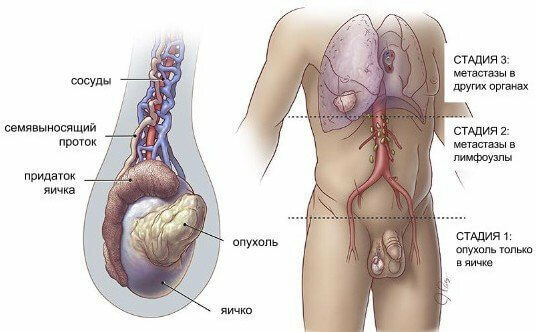
Cause of development of testicular cancer
Risk factors for the development of testicular cancer are extensive and diverse. To the causes of the disease include:
- the presence of tumors of another testicle in the past;Congenital conditions
- - cryptorchidism;
- presence of the immunodeficiency virus;
- hereditary factor;
- trauma and infertility;
- endocrine pathology;
- underdevelopment of one or both testicles, congenital inclusion of scar tissue;
- moles and nevi, able to acquire a malignant form;
- cancer of the bladder, urethra, or other genital area;
- early puberty;
- Klinefelter's syndrome;
- physical inactivity;
- hypothermia and inflammatory processes;
- regular overheating of the scrotum;
- alcoholism, drug use and abuse of nicotine;
- Testicular torsion;
- radiation exposure.
The professional activity of a man is of great importance.It is proved that the stronger sex, who work in the coal mining, tanning, oil or gas industry, is more often affected by this pathology.
Symptoms of testicular cancer
The first symptom of pathology is the appearance of a neoplasm in the form of a seal or nodule in the scrotum.They can cause painful sensations, or be painless.
Often patients complain of pain in the abdomen and scrotum, as well as swelling in the testicles.
Characteristic symptoms indicative of testicular cancer:
-
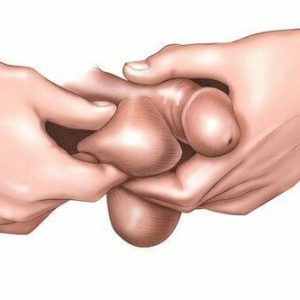 gynecomastia - a significant increase in the mammary glands;
gynecomastia - a significant increase in the mammary glands; - dull pain and a feeling of heaviness of the scrotum and lower abdomen;
- pain in the back;
- asymmetric scrotal enlargement, rounded seal and egg size change;
- decreased libido, impotence;
- fatigue, low-grade fever, weight loss due to nausea and lack of appetite, weakness;
- shortness of breath, cough and pain in the liver.
Important! If you see a scrotal edema, a dense patch, or a painful nodule, see a doctor immediately.Treatment in the early stages will help to save life.
Diagnosis of the disease
When making a diagnosis, complaints, a history of life and a hereditary factor are taken into account.The palpation of the lymph nodes, the scrotum and peritoneum, the mammary glands and the supraclavicular area are performed to identify gynecomastia.
Instrumental diagnosis of testicular cancer, as well as vital organs for the detection of individual metastases, conduct the following studies:
-
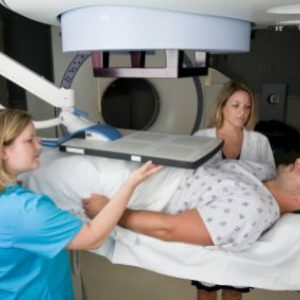 scrotal ultrasound.The study allows to determine the tumor process with 100% accuracy;
scrotal ultrasound.The study allows to determine the tumor process with 100% accuracy; - osteoscintigraphy.Allows you to specify the presence of metastases;
- Positron Emission Tomography;
- diaphanoscopy;
- magnetic resonance imaging;
- CT of the peritoneum, the space behind it and the thorax.
Perform an open aspiration biopsy by inguinal access.
Methods for treatment of testicular cancer and prognosis
Therapy for testicular cancer is based on radiation exposure, chemotherapy and the surgical method of .Characteristics of the tumor determines the characteristics of a particular method of treatment in a particular case.
Orhifonikullectomy( removal of a testicular with an epididymis and all its membranes) is the main method of surgical intervention.
For seminoma tumors, irradiation is performed after the operation.The dose is determined depending on the stage of the cancer.The number of chemotherapy courses corresponds to the activity of the tumor.
Neseminomnaya neoplasia proceeds aggressively and rapidly spreads.With this form are not limited to orhifuniklektomiey.It is mandatory to remove the retroperitoneal lymph nodes in the first stage with the subsequent chemoradiation effect.
Important! A favorable prognosis for testicular cancer concerns only tumors detected on time.In more than 90% of cases, the full recovery of occurs.
After surgery, chemotherapy and radiation are additionally prescribed. The success of therapy depends on the following factors:
- , when diagnosed with active metastasis on stage 2-3, complete cure is not possible, but 50% of men live 5 more years;
- detection in the early stages can save the lives of 90% of patients;
- if a man plans to become a father in the future, before the start of therapy, cryopreservation of sperm is carried out.
Often, the causes of testicular cancer are laid in the prenatal period of development.Therefore, it is impossible to completely exclude the risk of developing the disease.The main measure of prevention is timely correction of existing disorders, regular visits to the urologist and attentive attitude towards one's health.
Radevich Igor Tadeushevich, the doctor of the sexopathologist-andrologist of 1 category

